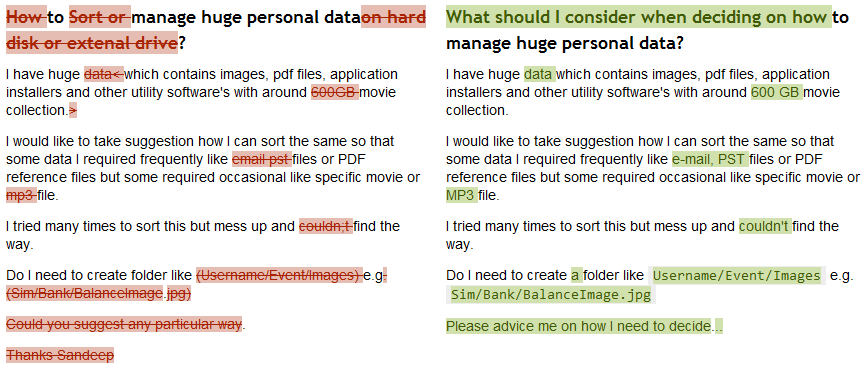This question is now deprecated, this is now to be resolved by: Please help reopen "What was scientifically shown to support productivity when structural organizing/accessing file and folders?"
My other meta question bases of my own asked question (which is constructive) but has been closed as off-topic, my own question would help a lot of future users that ask similar questions. Hence is why I don't interest myself any more in the case in this meta question, but rather in the more general case which looks for valuable backed up advice instead of semantical suggestions...
Please help reopen What should I consider when deciding on how to manage huge personal data?
This post has been changed around to be around advice rather than specific suggestions.

This is what the Q&A is hard! Let's go shopping... also tells us:
The former question provides the path of least resistance: a laundry list of products I can buy without thinking about it too much. But that answer will only be valid for a year at best. The latter question may take some thinking, but its answer will be valid forever … or at least until camera technology somehow shifts beyond lenses and sensors as we know them today. Thus, when it comes to shopping questions, don’t ask us what you should buy — ask us what you need to learn to tell what you should buy.
Take a careful look at my answer, it puts "Look at the subjects / characteristics of your personal data" at first which is useful advice, then it expands on that with examples and a more general approach at the bottom. I'm not suggesting any directory structure here, that's what the OP has to do using our advice.
The other answer(s) also do the same, outlining that directory structures are hierarchical and explaining something similar to what I did. Again, this is all advice and it's not a suggestion...
This is what I would consider a directory structure suggestion:
Music in /Music, put older music in /Music/Old
Documents should go in /Documents, study material should go in /Documents/Unvirsity
... some more very specific things, and then the full file tree ...
However, this is not how the current answers are formed.
So, I don't see how the close reason applies to this question and hence would like to see this useful Q&A to be reopened as choosnig the right directory structure is a valid problem that often reoccurs to many people that tend to organize their data to be more productive, this question also passes the good subjective, bad subjective guidelines (if you don't agree, perhaps you can improve it further?).
If you decide to keep it closed, expect me to ask it again in a similar form.
Or well, maybe part of the Super User community has just became close-minded:
We want to help our new users and make their contributions more valuable where they are salvageable, not bury their contributions without even trying. We're here to learn and make the internet a better place.
